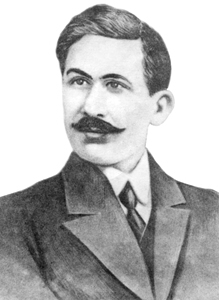- Abbas Sahhat
Infobox Person
name = Abbas Sahhat

image_size = 180px
caption = Abbas Sahhat
birth_date = 1874
birth_place =Shamakhi ,Baku Governorate ,Russian Empire (in present-dayAzerbaijan )
death_date =11 July 1918
death_place =Ganja ,Azerbaijan
education = Madraseh-ye Nezamiyyeh-ye Nasiriyyeh,Tehran
occupation = Physician, journalist, teacher, translator
spouse =
parents =
children =Abbas Sahhat ( _az. Abbas Səhhət), born Abbasgulu Aliabbas oglu Mehdizadeh (1874,
Shamakhi –11 July 1918 ,Ganja ), was anAzerbaijan i poet and dramatist.Life and career
Abbas Sahhat was born into a family of a cleric in the city of Shamakhi. He received his primary education from his father. At age 15 he started writing amateur poems.tr icon [http://www.kultur.gov.tr/TR/Tempdosyalar/109864__abbassehhet.pdf Abbas Sahhat] . "Kultur.gov.tr"] Beginning in 1892 he studied
medicine inMashhad andTehran . After returning to Shamakhi around 1900 he abandoned his professional field, as Russian institutions did not recognize medical diplomas from Iran. Sahhat started teaching Azeri and literature first in primary schools and then in aRealschule . This period is considered the beginning of his career as a poet and playwright. In 1903 he began writing articles for the Azeri-language newspaper "Sharg-i Rus", published inTiflis . His articles mostly discussed topics in contemporary literature.az icon [http://www.sayt.ws/shexsiyyetler/bbbbb/adabiyyat/sahhat.html Abbas Sahhat] . "Sayt.ws"]As a poet, Sahhat adhered generally to
romanticism . His poetry was influenced byAli bey Huseynzadeh , editor of the "Fuyuzat" magazine in 1905–1907. Sahhat also translated works of Pushkin, Lermontov, Nadson, Krylov, Hugo, Musset, Prudhomme,Amir Khusro as well as a number of German and Armenian poets into Azeri.In 1912 he published his first collection of poems entitled "Sinig saz" ("Broken
Saz "), his narrative poem "Ahmadin shujaati" and his translations of Western European literature under the name "Garb gunashi" ("The Sun of the West"). In 1916 his romantic poem "Shah, muza va shaharli" was published. In his literary style, influence of classical poets such asNezami ,Hafez and Saadi, and modern poets such asTevfik Fikret , is seen.Among his dramatic pieces, "Neft fontani" (1912) and "Yoxsullug ayib deyil" (1913) are noteworthy. There are accounts of a novel written by Sahhat and entitled "Ali and Aisha". It was never published and its manuscript is believed to have perished during the Dashnak occupation of Shamakhi in April 1918, when Sahhat's house was ravaged and burned. The poet himself managed to escape the town with his family, fleeing first to
Kurdamir and later to Ganja, where he died some months later of stroke.Abbas Sahhat was in favour of liberal
bourgeoisie and, due to hisIran ian academic upbringing, disagreed with masssecularisation that was taking place among Azeris beginning in the early 20th century. Instead he promoted a more moderate idea of all-Muslimwesternization . He dedicated some of his finest pieces of poetry to theIranian Constitutional Revolution , in which he presented himself as a realist poet. [ru icon Литературная энциклопедия 1929—1939. "Аббас Сиххат"]References
Wikimedia Foundation. 2010.
